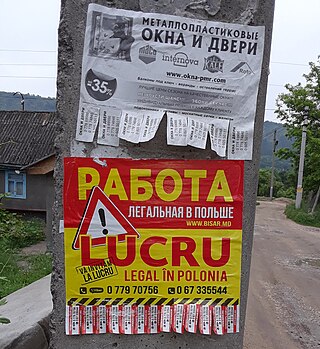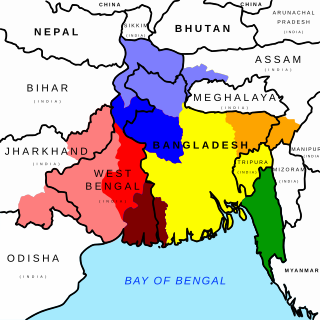Related Research Articles

The economy of Bangladesh is a major developing market economy. As the second-largest economy in South Asia, Bangladesh's economy is the 35th largest in the world in nominal terms, and 25th largest by purchasing power parity. Bangladesh is seen by various financial institutions as one of the Next Eleven. It has been transitioning from being a frontier market into an emerging market. Bangladesh is a member of the South Asian Free Trade Area and the World Trade Organization. In fiscal year 2021–2022, Bangladesh registered a GDP growth rate of 7.2% after the global pandemic. Bangladesh is one of the fastest growing economies in the world.

The Padma is a major river in Bangladesh. It is the main distributary of the Ganges, flowing generally southeast for 356 kilometres (221 mi) to its confluence with the Meghna River near the Bay of Bengal. The city of Rajshahi is situated on the banks of the river. Since 1966, over 66,000 hectares of land has been lost to erosion of the Padma.

A remittance is a non-commercial transfer of money by a foreign worker, a member of a diaspora community, or a citizen with familial ties abroad, for household income in their home country or homeland. Money sent home by migrants competes with international aid as one of the largest financial inflows to developing countries. Workers' remittances are a significant part of international capital flows, especially with regard to labor-exporting countries.

Bangladesh–India relations are the bilateral relations between the People's Republic of Bangladesh and the Republic of India, both of which are South Asian neighbours. Diplomatic relations between the two countries formally began in 1971 with India's recognition of an independent Bangladesh following India's military intervention helping Bangladesh secure independence following the Bangladesh Liberation War. On 6 December, Bangladesh and India celebrate Friendship Day commemorating India's recognition of Bangladesh and the continued friendship between the two countries.
Rupali Bank is a state owned commercial bank in Bangladesh. Its headquarters is in 34 Dilkusha, Dhaka. Kazi Sanaul Haque is the chairman of the bank. Mohammad Jahangir is the managing director of the bank.

Since its independence in 1947, India has accepted various groups of refugees from neighbouring countries, including partition refugees from former British Indian territories that now constitute Pakistan and Bangladesh, Tibetan refugees that arrived in 1959, Chakma refugees from present day Bangladesh in early 1960s, other Bangladeshi refugees in 1965 and 1971, Sri Lankan Tamil refugees from the 1980s and most recently Rohingya refugees from Myanmar. In 1992, India was seen to be hosting 400,000 refugees from eight countries. According to records with the Union Ministry of Home Affairs, as on January 1,2021, there were 58,843 Sri Lankan refugees staying in 108 refugee camps in Tamil Nadu and 54 in Odisha and 72,312 Tibetan refugees have been living in India.
2007 (MMVII) was a common year starting on Monday of the Gregorian calendar, the 2007th year of the Common Era (CE) and Anno Domini (AD) designations, the 7th year of the 3rd millennium and the 21st century, and the 8th year of the 2000s decade.
Remittances to India are money transfers from non-resident Indians (NRIs) employed outside the country to family, friends or relatives residing in India. India is the world's top receiver of remittances, claiming more than 12% of the world's remittances in 2015. Remittances to India stood at US$110 billion in 2022, US$125 billion in 2023 and remittances from India to other countries totalled US$5.710 billion, for a net inflow of US$63.258 billion in 2017.

The Bangladeshi diaspora are people of Bangladeshi birth, descent or origin who live outside of Bangladesh. First-generation migrants may have moved abroad from Bangladesh for various reasons including better living conditions, to escape poverty, to support their financial condition, or to send money back to families there. The Ministry of Expatriates' Welfare and Overseas Employment estimates there are almost 7.5 million Bangladeshis living abroad, the fourth highest among the top 176 countries of origin for international migrants. Annual remittances transferred to Bangladesh were almost $23 billion in 2023, the seventh highest in the world and the third highest in South Asia.

The Padma Multipurpose Bridge, commonly known as the Padma Bridge, is a two-level road-rail bridge across the Padma River, the main distributary of the Ganges in Bangladesh. It connects Louhajang Upazila of Munshiganj and Zazira Upazila of Shariatpur and a small part of Shibchar Upazila of Madaripur, linking the less developed southwest of the country to the northern and eastern regions. The bridge was inaugurated in the morning of 25 June 2022 by the Prime Minister Sheikh Hasina.

Bangladeshis are the citizens of Bangladesh, a South Asian country centred on the transnational historical region of Bengal along the eponymous bay.
Bangladeshis in India are members of the Bangladesh diaspora who currently reside in India. The mass migration into India since Bangladesh independence has led to the creation of anti-foreigner movements, instances of mass violence and political tension between Bangladesh and India, but it has also created measurable economic benefits for both nations.
An illegal immigrant in India is a foreigner who has entered India either without valid documents or who initially had a valid document, but has overstayed beyond the permitted time, as per the general provisions of the Citizenship Act as amended in 2003. Such persons are not eligible for citizenship by registration or naturalisation. They are also liable to be imprisoned for 2–8 years and fined.
This article describes movies made jointly by cinema production houses of India, typically West Bengal, and Bangladesh, sometimes Maharashtra
Deaths along the Bangladesh–India border occur many times a year as result of people attempting to illegally cross into India from Bangladesh, for walking along the border, cross border firing and cattle smuggling. Bangladesh and India share a 4,096 kilometer border. To prevent smuggling and illegal migration from Bangladesh, the Indian Border Security Force exercises its controversial "Shoot-on-sight" policy. Under this policy, the BSF can shoot any person on site with or without cause. A large portion of the victims are cattle traders and farmers with land near the border. Brad Adams, stated that, "Routinely shooting poor, unarmed villagers is not how the world's largest democracy should behave."
Syeda Sajeda Chowdhury was a Bangladeshi politician. She served as a Jatiya Sangsad member representing the Faridpur-2 constituency from 2008 till her death in 2022. She also served as the Environment and Forest Minister of Bangladesh during 1996–2001.

Rubana Huq is a Bangladeshi businesswoman, university academic and poet. She is the current Vice-chancellor of Asian University for Women (AUW) since February 2022.
The Padma Bridge graft scandal was a political scandal in Bangladesh in 2016 and 2017, involving the Bangladesh Awami League and the Padma Bridge, a 6.15-kilometer (3.82 mi) road—rail bridge across the Padma River and Bangladesh's largest bridge.
Bishorjan (transl. Immersion) is a 2017 Indian Bengali-language film written and directed by Kaushik Ganguly, produced by Opera Productions. It stars Abir Chatterjee, and Jaya Ahsan. The story revolves around a love story between a Bangladeshi Hindu widow and Indian Muslim businessman, who one day washes up on the Bangladesh side of the Ichamati river.

Bangladesh–Libya relations refer to the bilateral relations between Bangladesh and Libya.
References
- 1 2 3 "Bangladesh-India economic relations". The Financial Express . 2009. Archived from the original on 15 August 2009.
- ↑ "Bangladesh becomes 4th largestremittance source for India – The Daily Industry" . Retrieved 25 October 2023.
- ↑ Sadeque, Syeda Samira (16 May 2014). "Dhaka has a question: what about the illegal Indian immigrants in Bangladesh?". Scroll.in. Retrieved 25 October 2023.
- ↑ "Indian national arrested near Padma Bridge". The Daily Star. 27 June 2021. Retrieved 1 July 2021.
- ↑ Sadeque, Syeda Samira. "Dhaka has a question: what about the illegal Indian immigrants in Bangladesh?". Scroll.in. Retrieved 20 April 2017.
- ↑ Madhok, Diksha (15 June 2014). "Bangladeshis in India sent back $6.6 billion last year". Quartz India. Retrieved 16 June 2014.
- ↑ Procee, Paul (5 May 2013). "Bilateral Remittance Estimates for 2013 using Migrant Stocks, Host Country Incomes, and Origin Country Incomes (millions of US$) (April 2015 Version)". World Bank: 1–9.
- ↑ "Controlling remittance outflow to India". The Daily Star. 8 January 2015. Retrieved 20 April 2017.
- ↑ "Flood-affected Indians take shelter in Bangladesh". The Daily Star. 27 July 2016. Retrieved 20 April 2017.